The heroic parent has to do the right thing and put good over family and kill the villainous child.
Star Wars: The Roleplaying Game 30th Anniversary Edition
Now that’s a game I have not heard from in a long time. A long time…
This comes completely out of nowhere. Fantasy Flight Games, the current license holder for Star Wars pen and paper Roleplaying Games, is releasing a 30th Anniversary Edition of the one and only original Star Wars Roleplaying Game.
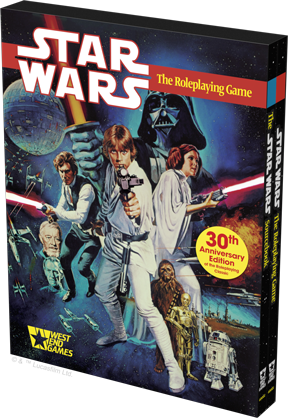
It looks to even be the first edition, which is widely regarded as the best edition of the West End Games game because of its simplicity, and even as the best Star Wars ever made. It’s described as a limited edition but priced at a reasonable $60. Which leaves the question how limited it will really be.
It’s a fantastic game, but I think in the current RPG market there is probably little risk of this becoming any kind of threat to FFG’s own Star Wars game. Small and tidy games don’t seem to be making it big these days and customers love their piles of splatbooks with lots of pictures and endless character customization. Which this game certainly doesn’t have.
If I could get my hands on one for $60, I’d definitely buy it.
I just gave up on the new Star Wars
For me, the last two Star Wars movies rank at the very bottom together with Episode 2, all below Episode 1. But I was still having some hope that Rogue One was meant as a quick cash grab (which the Han Solo movie seems to follow) and that Episode 8 could finally turn things around with Jeffrey Abrams being gone.
But I just learned that Abrams will be back for Episode 9. So whatever good might come out of 8 will all become irrelevant anyway.
Thanks, but no. I gave this new series two tries and I just can’t get myself to care.
My favorite style of fiction I never knew I had
![]() Having recently seen Drive and looking around for interpretations about it, I came upon a term that I had never really paid much attention to.
Having recently seen Drive and looking around for interpretations about it, I came upon a term that I had never really paid much attention to.
Neo-Noir.
What is Neo-Noir? It really is pretty much the same as Noir except that it’s used for works made from the 80s forward instead of up to the 60s. Other good recent examples are basically the whole Nolan movie catalogue, with Inception and The Dark Knight standing out prominently. (Memento and Insomnia also really look like it, but I have not seen them yet.)
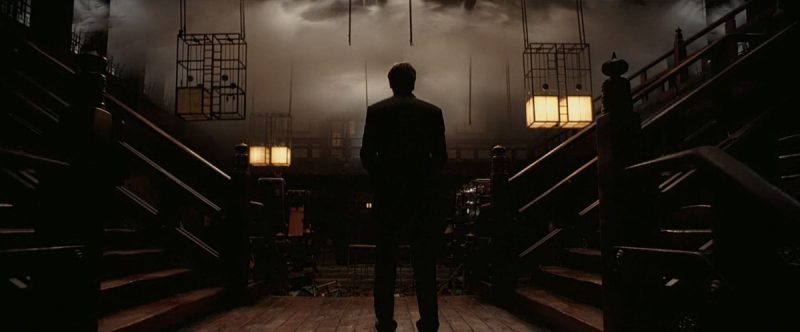 Inception is my second favorite movie of all time, beaten only by The Empire Strikes Back. And when you stop and think about it, that movie also has Noir aesthetics all over it. Pretty much everything happening in Cloud City is prime Noir material.
Inception is my second favorite movie of all time, beaten only by The Empire Strikes Back. And when you stop and think about it, that movie also has Noir aesthetics all over it. Pretty much everything happening in Cloud City is prime Noir material.
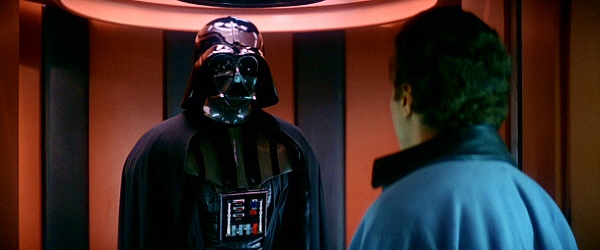 Looking back at it, the first works of this style that I really fell in love with were Blade Runner and Ghost in the Shell (including the TV series). Of course, you could argue that these are perhaps the two biggest cyberpunk movies ever made. But what is cyberpunk other than Noir with futuristic elements?
Looking back at it, the first works of this style that I really fell in love with were Blade Runner and Ghost in the Shell (including the TV series). Of course, you could argue that these are perhaps the two biggest cyberpunk movies ever made. But what is cyberpunk other than Noir with futuristic elements?
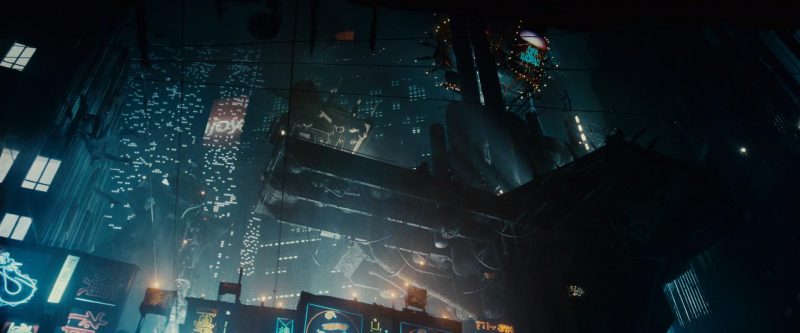
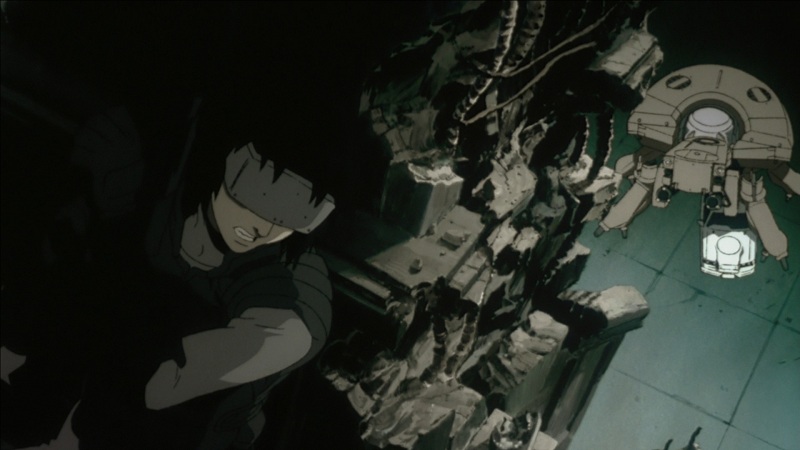 Which reminded me of Mirror’s Edge, one of my favorite videogames that I’ve always been thinking of as “cyberpunk without the futuristic elements”. Yeah, once you consider Neo-Noir to be a distinct category, it falls perfectly into it. The socially isolated protagonist living in a blurry gray world on the edge of legality. Characters looking for meaning in a heartless world and coming to bleak realizations about their own lives. And they hang out in a place that looks like this.
Which reminded me of Mirror’s Edge, one of my favorite videogames that I’ve always been thinking of as “cyberpunk without the futuristic elements”. Yeah, once you consider Neo-Noir to be a distinct category, it falls perfectly into it. The socially isolated protagonist living in a blurry gray world on the edge of legality. Characters looking for meaning in a heartless world and coming to bleak realizations about their own lives. And they hang out in a place that looks like this.
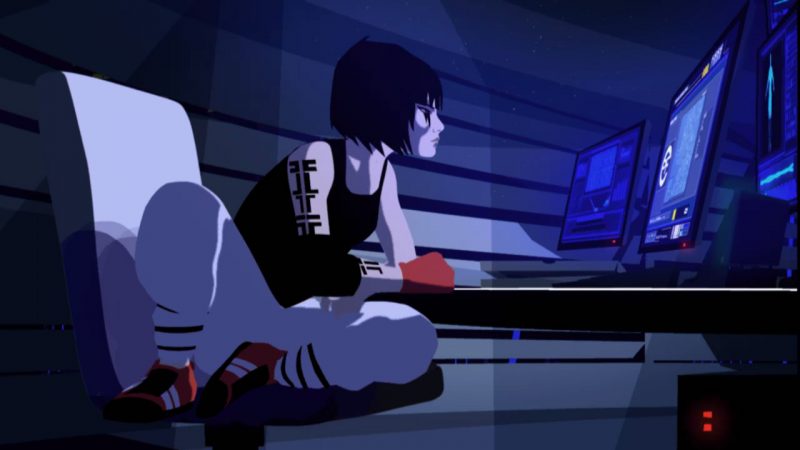 And suddenly it all came together: Mass Effect 2 is also a work of Neo Noir. The first game had already blown my mind, but I was amazed when I came out to the street on Omega. And never had a game felt so perfect as when I first stepped through the door into Afterlife. It is my favorite game of all time, with no contenders.
And suddenly it all came together: Mass Effect 2 is also a work of Neo Noir. The first game had already blown my mind, but I was amazed when I came out to the street on Omega. And never had a game felt so perfect as when I first stepped through the door into Afterlife. It is my favorite game of all time, with no contenders.
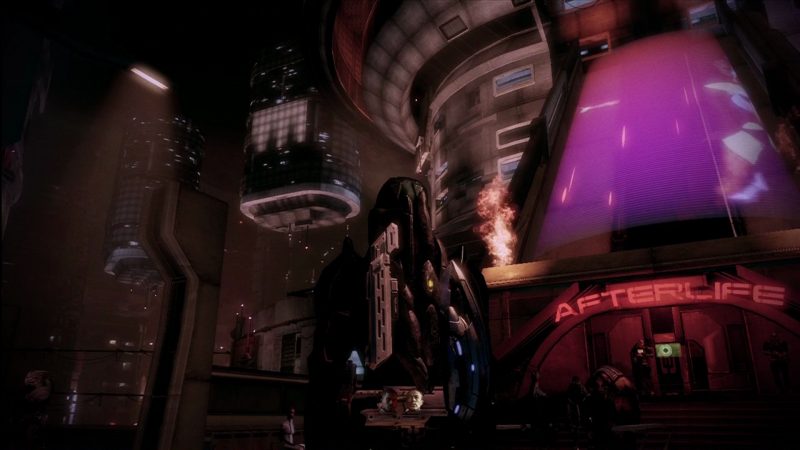 After the really cool opening and time jump, the game starts with the Illusive Man smoking in a dark room with his Femme Fatale henchwoman Miranda next to him. I could write a whole article about that. (And I probably will, eventually.)
After the really cool opening and time jump, the game starts with the Illusive Man smoking in a dark room with his Femme Fatale henchwoman Miranda next to him. I could write a whole article about that. (And I probably will, eventually.)
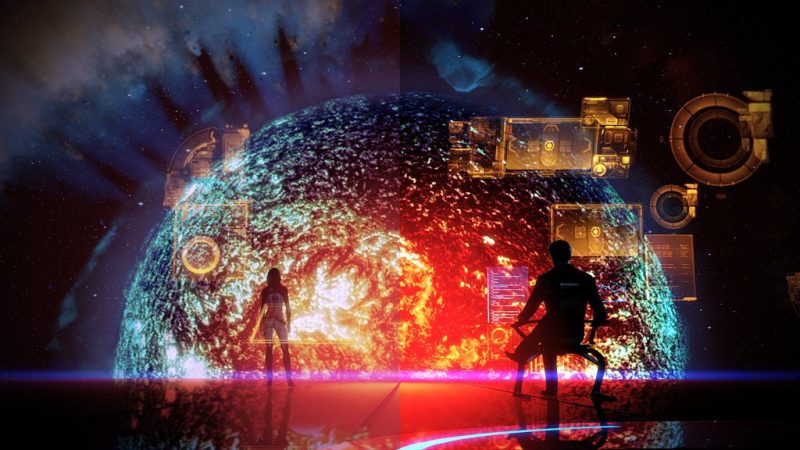 It might be a bit of a stretch, but I feel that there are at least a great deal of thematic elements of Noir in the Witcher books. The world went to crap, there’s no justice, characters with questionable morales are trying to do the right thing when dealing with those who are morally bancrupt, and there’s always a slight doubt that maybe everyone getting conquered by the Empire might not be the worst idea. And while it would probably be a bit nonsensical to call Bound by Flame a noir fantasy game, the mood of dignified despair is certainly there.
It might be a bit of a stretch, but I feel that there are at least a great deal of thematic elements of Noir in the Witcher books. The world went to crap, there’s no justice, characters with questionable morales are trying to do the right thing when dealing with those who are morally bancrupt, and there’s always a slight doubt that maybe everyone getting conquered by the Empire might not be the worst idea. And while it would probably be a bit nonsensical to call Bound by Flame a noir fantasy game, the mood of dignified despair is certainly there.
Bonus content: All my favorite episodes of Star Trek: Deep Space Nine. You know, basically everything with Garak in it. (The Wire, Improbable Cause/The Die is cast, and In Pale Moonlight stand out.)
It comes as a bit of a surprise after all these years that there’s an umbrella term that encompasses pretty much my entire top list of greatest works of fiction ever made. But then, many of the works I mentioned are considered to be really great by a lot of people around the world, so it’s not like this is a style that hasn’t proven itself over the past decades. The period of their making also started just before I was born, which probably isn’t a coincidence either. It’s a style that I’ve been exposed to all my life. While the aesthetics of Noir and Neo-Noir are generally pretty easy to pin down, definitions of the genre are usually rather blurred and unclear. Yet at the same time, works tend to fall into a pretty narrow band of stories. Socially isolated protagonists who are living with one foot in prison and one foot in the grave whose lives have become empty and who are searching for any kind of meaning in their seemingly bleak worlds. Sometimes they catch a faint glimer of hope they can pursue, other times they doom themselves.
Questions about identity and filling an inherently meaningless existence with meaning are the basic foundations of Existentialism, which to me is really the only thing worth exploring in a story. I’ve been watching, reading, and playing stories of this type for all of my adult life and so I probably already do know most of what there is to know about it on an intuitive level. But as someone interesting in writing my own stories this seems like a great opportunity to refocusing my research.
Update: Some more that I totally forgot and didn’t think about: Hellboy, Thief, The Big Lebowsky, Leon the Professional, True Detective, Breaking Bad. I think it’s probably much harder for me to come up with a list of movies, videogames, and TV shows that don’t have a strong Neo-Noir aesthetic.
Originality of Experience
I’ve recently been thinking about the question of originality. When discussing the creation of stories, particularly of beginning writers, frequently the question comes up whether the work feels original or rather derivative. Originality is widely treated as perhaps the most important thing for a new writer. Yet at the same time there are famous lines like “all great stories have already been told”, “all art is derivative”, and “there is nothing new under the sun”. How is one supposed to write a good original story like that?
I think it is important to make a clear distinction between originality of content and originality of meaning. Content is all the many pieces from which a story is assembled. The characters, the setting, the props, and also plots and situations. To come up with a character or plot, or even just a monster or magic spell that is completely original is extremely difficult to the point of perhaps being impossible. When it comes to these elements that make up a story, I believe that all art is indeed derivative.
I think it’s pretty safe to assume that all our storytelling evolved from the telling of accounts of actual events that were embelished for dramatic effect. And it doesn’t take any big leaps to tell stories in which nothing has actually happened in reality. But such stories are not simply made up from nothing. They are constructed from elements that already exist. Any country, state, or nation you can imagine is based on already existing examples in the actual world, and all monsters are evolving embelishments of regular animals. To try to be truly original in these things is not only futile, but also completely unnecessary.
However, a story is not just characters, situations, and environments. What is really interesting about stories is how the characters in them react to and interact with the situations and other characters they encounter. How it affects them, what they want to do about it, and what their opinions on them are. This is where writers have the opportunity to put their own unique stamp on a work and create something fresh and original. You are unique and special. Just like everyone else. While this doesn’t make anyone better, it makes everyone different. And this difference is what allows writers to be original with their stories. When you write your own stories, you can have characters do in a given situation what you think they should do. Feel what you think they should feel. And actions have the consequences you think they should have. Instead of what conventions and traditions say usually happens in such situations. I discussed this in the Fantasy Faction forum and one person called this the Originality of Experience. You have characters that are familiar, in situations that are familiar, surrounded by things that are familiar. There is pretty little that can be done about that. But the reason we’re reading or watching a story is because we want to see how it will all play out this time and hoping that it will provide us with a new experience. That’s really what originality is all about.
Master Sword & Sorcery
The Legend of Zelda is Sword & Sorcery for kids.
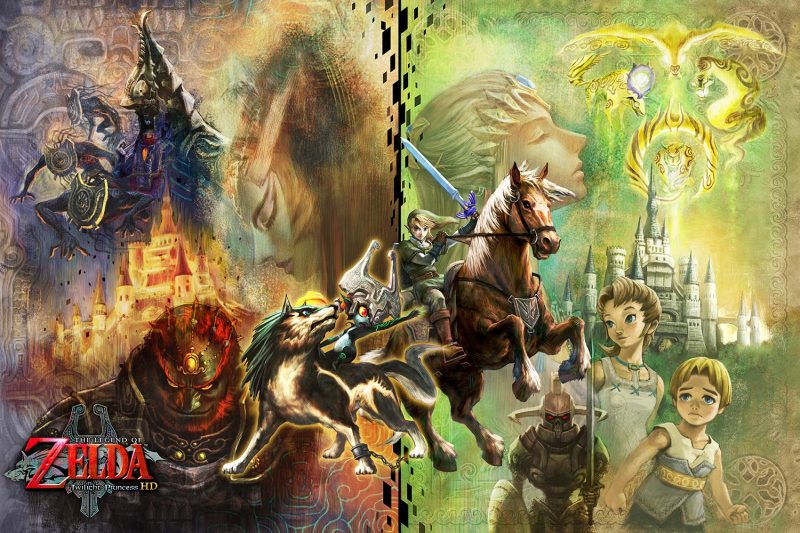
Think about it. It makes perfect sense!
